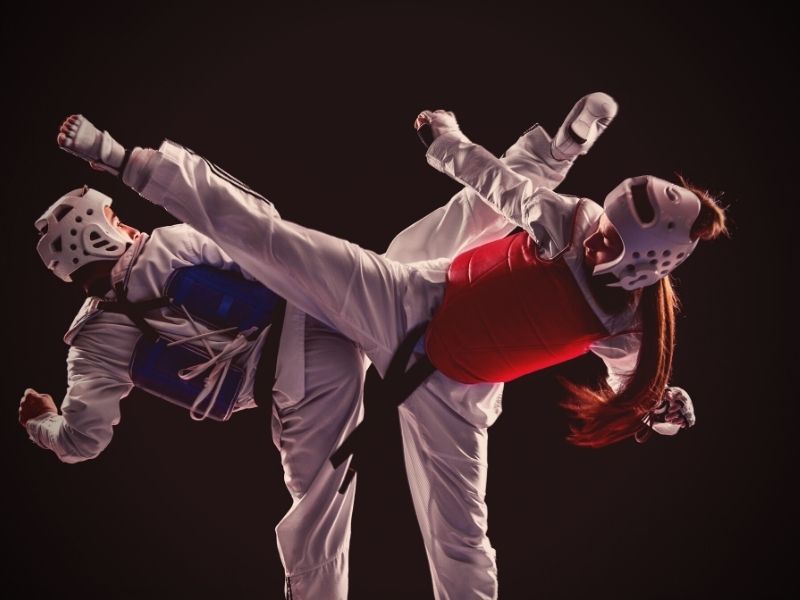
Looking to get into Taekwondo for self-defense? If you are, then you've made a great choice. It's an incredible martial art that's definitely worth looking into.
But if you're entirely new, then you're probably still wondering, "is Taekwondo dangerous?" And I get you, I totally do! And you'd be entirely reasonable for thinking this way, especially since safety should always be your top priority.
Tons of people ask themselves that question before actually getting started with the hobby, and it's entirely a sound question thing to be curious about in the first place. Thankfully for you, I've got all the facts you need right here in this article. Let's get into it!
Is Taekwondo Dangerous? The Risks Explained

Taekwondo is a popular form of exercise and self-defense, but there definitely are some risks associated with it, arguably foremost among them being the risk of injuries.
I don't think this really surprises you though. The sport involves a lot of pretty darn powerful kicks, sweeps, and other similar maneuvers, and you can imagine how easy it'd be to hurt yourself if you don't know what you're doing.
Beginners are particularly susceptible to sprains, strains, and other types of injuries that we'll get into in just a bit. But in general, yes, lots of pretty nasty things can happen to you if you're not careful.
Regardless, Taekwondo remains a popular form of exercise and self-defense, and that's not without good reason. Just stay careful while you train, which we'll show you how to do in just a bit.
The Most Common Injuries Sustained In Taekwondo

Some injuries you should watch out for in Taekwondo are:
- Sprains and Strains: These injuries are common in Taekwondo due to the fast-paced nature of the sport. They often occur when you make a sudden movement, such as changing direction quickly or when you stretch or twist your body in an awkward way.
These movements can cause your muscles or ligaments to get some fairly nasty stretches or tears, leading to pain, swelling, and limited mobility. - Head Injuries: Head injuries are a significant concern in combat sports such as Taekwondo. Blows to the head can cause concussions, which are a type of brain injury that can result in headaches, dizziness, confusion, and memory loss.
Repeated head injuries can even lead to chronic traumatic encephalopathy (CTE), a degenerative brain disease. - Knee Injuries: Knees are one of the most vulnerable areas in Taekwondo, as they are often targeted by strikes such as kicks and knees.
These attacks can easily cause your knee to twist or hyperextend, which can lead to ligament tears, meniscus injuries, and other serious problems. - Ankle Injuries: Like the knees, the ankles are also at risk of injury in Taekwondo. When you kick someone, you might also end up twisting your own ankle, which... well, you can probably imagine why that won't turn out good for you.
These injuries can be a fair bit more painful than the other things we mentioned in this list, and they may require rest and rehabilitation to heal properly. - Shin Splints: Shin splints are a common injury in Taekwondo due to the heavy degree of impacts involved in the sport. These injuries occur when the muscles and tendons in your shin become inflamed and irritated, causing pain and discomfort.
Shin splints can overall be prevented by gradually increasing your training intensity and by wearing proper footwear with good shock absorption.
Additional Risks Involved When Practicing Taekwondo

Those aren't the only things you should watch out for though. There are a few other things you'll need to be mindful of, like infectious diseases.
Skin infections and staphylococcus infections are just a couple of the communicable diseases that can be spread through contact with contaminated training equipment or other individuals. Don't worry too much though, because there are ways to minimize your risk of infection.
One way to do just that is by, surprise surprise, practicing good hygiene! Thoroughly wash both your body and your training gear after each training session. You'll likely already wnat to do this just to cool down, but it's worth mentioning either way.
Also avoid sharing personal items, like towels or water bottles, with others. It's not that you want to be mean to anyone, but these things are great avenues for bacteria and viral infections to spread. You just want to play things safe, that's all.
So remember, your enemy here isn't just physical injuries, but also infectious diseases. And when engaging in close physical contact with other people during your training or competitions, your risk of infection will only increase.
And yeah, sure, the chances of contracting a disease will likely be low at the end of the day, but it's still crucial for you to be mindful of them, especially when the consequences can be pretty serious.
How To Stay Safe When Practicing Taekwondo

There are definitely a few risks inherent to practicing Taekwondo, I won't deny that. But I will also tell you that a lot of these can be minimized with proper training and supervision. If you're careful and know what you're doing, then there's very little you should be worried about.
And just so we're on the same page, being "careful" in this case means:
- Warming up and stretching before every training session;
- Wearing the proper protective gear, such as a mouthguard and headgear
- Listening to your body and not pushing through pain or injury;
- Practicing good hygiene and cleaning all equipment regularly;
- Avoiding unsanitary environments;
Granted, you can be extremely careful and still have an accident happen to you, it's true. That's why it's an accident, after all. Try to research beforehand on what to do in case these things happen to you.
Keep in mind the signs and symptoms of a concussion, for example, such as nausea and confusion, and have contacts with medical assistance ready in case you ever need something.
The Wrap-Up
Well, there you have it! Taekwondo, like any physical activity, comes with its fair share of risks, but they can be minimized by following proper safety precautions and hygiene practices.
Injuries and infectious diseases are potential dangers, yes, but they absolutely shouldn't deter you from practicing this incredible martial art.
So for those of you interested in exploring the world of Taekwondo, don't be afraid to take that first step. You'll be glad you embarked on this journey of self-discovery and growth.
[author-box-jpx-fitness]
